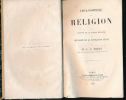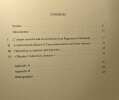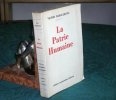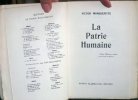-
Type
Autograph (1)
Book (52810)
Magazine (286)
Manuscript (2)
Maps (1)
New book (1)
Old papers (1)
Photographs (1)
-
Latest
Last 24h (26)
Last 3 days (13)
Last month (482)
Last week (115)
-
Language
Dutch (1)
English (28)
Finnish (1)
French (53001)
German (16)
Greek (5)
Italian (17)
Japanese (2)
Latin (20)
Polish (1)
Portuguese (2)
Russian (1)
Spanish (6)
Swedish (2)
-
Century
16th (66)
17th (193)
18th (1282)
19th (3658)
20th (22377)
21st (3771)
-
Countries
Belgium (6752)
Brazil (27)
Canada (6)
China (2)
Côte d'Ivoire (43)
Denmark (1013)
France (40361)
Germany (4)
Greece (3)
Italy (54)
Netherlands (281)
Switzerland (4556)
United States of America (1)
-
Syndicate
ALAC (6)
CLAM (5)
CNE (4)
ILAB (22193)
NVVA (1045)
SLACES (953)
SLAM (19869)
SNCAO (41)
Notes provocatrices , traduit de l'allemand par Lily Jumel
Gallimard , Essais Malicorne sur Sarthe, 72, Pays de la Loire, France 1964 Book condition, Etat : Très Bon broché In-8 1 vol. - 227 pages
Contents, Chapitres : quelques notes touchant à tous les genres - notes touchant à la technique - religion, métaphysique et causalité - formes, arts, surcharges métaphysiques - notes touchant à la littérature dans son sens le plus général
Passions philosophiques. Parcours
L'Age d'Homme L'Age d'Homme, 1998. In-8 broché de 203 pages. Très bon état.
Toutes les expéditions sont faites en suivi au-dessus de 25 euros. Expédition quotidienne pour les envois simples, suivis, recommandés ou Colissimo.
The Philosophy of Peter Abelard
Cambridge University Press 2008 396 pages 15 2x3 2x22 6cm. 2008. Broché. 396 pages.
Très bon état de conservation premier plat un peu défraîchi sur ses bords
Le temps, l'éternité et la prescience de Boèce à Thomas d'Aquin
Paris, J. Vrin 2005 188pp., 22cm., dans la collection "Conférences Pierre Abélard", brochure originale, bel état, ISBN 2-7116-1770-X, F66365
The philosophy of Peter Abelard
Cambridge, Cambridge University Press 1997 xx + 373pp., 24cm., hardcover (cloth), VG, ISBN 0-521-55397-0
Abelard's Collationes (Oxford Medieval Texts)
Oxford University Press 2001 368 pages 14 22x3 05x21 84cm. 2001. Cartonné jaquette. 368 pages.
livre en tres bon état intérieur propre bonne tenue avec sa jaquette (dos légèrement insolée une déchirure en haut du premier plat)
La communion avec le Christ selon la catéchèse française actuelle
In-8 broché, Pontificia Universitas Gregoriana, 1984, X + 130 pp. Un peu frotté, piqué et écorné, usure d'usage, bon état général. Peu courant. Dédicacé par l'auteur. Poids 250 g. Frais d'envoi 3,55 euros sur la France, 6,15 euros UE et Suisse, 7,60 euros pour le reste du monde (tarifs de base hors envois suivis).
Dédicacé par l'auteur
Sénèque, légende ou mythe ?
Bruxelles, Aux Armes de Minerve, 1966. 16 x 22, 46 pp., broché, bon état (couverture légèrement défraîchie).
Essai sur le panthéisme dans les sociétés modernes. Deuxième édition revue et augmentée.
1841 Paris, Fulgence, 1841, in 8° broché, XIX-407 pages ; couverture défraichie.
...................... Photos sur demande ..........................


Phone number : 04 77 32 63 69
Essai sur le panthéisme dans les sociétés modernes. Deuxième édition, revue et augmentée.
Paris, Fulgence Olivier 1841, 225x140mm, XIX - 467pages, broché. Non rogné. Plis et petites déchirures sur la couverture supérieure. Coins légèrement pliés.
Pour un paiement via PayPal, veuillez nous en faire la demande et nous vous enverrons une facture PayPal
Essai sur le Panthéisme dans les Sociétés Modernes
Deuxième édition, revue et augmentée, 1 vol. in-8 reliure de l'époque pleine basane verte, dos lise, plats estampés à froid, Olivier Fulgence Paris 1841, XIX-467 pp.
Très intéressant ouvrage de l'abbé et théologien Henri Maret (1805-1884) sur ce thème qui joua un rôle important dans les controverses entre catholiques et rationalistes entre 1835 et 1865. C'est d'ailleurs en s'employant à la réfutation de ces accusations qu'un auteur comme Emile Saisset se lancera dans l'étude de Spinoza et en deviendra le premier traducteur des oeuvres complètes ! Etat très satisfaisant (reliure frottée, des rouss.)
Le parlement. Réflexions d’un « sauvage » sur le régime
F.Rieder 1920 In-12 demi chagrin bleu, Dos à nerfs. 18 cm sur 11,8. 187 pages. Bon état d’occasion.
Bon état d’occasion
ESSAI SUR LA PANTHEISME DANS LES SOCIETES MODERNES - TROISIEME EDITION
MEQUIGNON JUNIOR ET J. LEROUX. 1845. In-8. Broché. Etat d'usage, Plats abîmés, Dos abîmé, Intérieur frais. XXXI + 112 pages - 1 papier kraft marron en bordures des plats et au dos - 1 tampon sur le 1er plat et sur la page de faux-titre - 1 etiquette collée au dos et sur la page de faux-titre - 2eme plat absent - 2 tampons sur la page de titre.. . . . Classification Dewey : 100-PHILOSOPHIE ET DISCIPLINES CONNEXES
Classification Dewey : 100-PHILOSOPHIE ET DISCIPLINES CONNEXES
Philosophie et religion. Diginté de la raison humaine et nécessité de la révélation divine
Paris, Lertoux et Jouby Paris, Lertoux et Jouby, 1856. In-8 relié demi-basane verte, dos à nerfs, titre doré, fleurons. XX + 544 pages. Bon état
Toutes les expéditions sont faites en suivi au-dessus de 25 euros. Expédition quotidienne pour les envois simples, suivis, recommandés ou Colissimo.
Théodicée chrétienne ou Comparaison de la notion chrétienne avec la notion rationaliste de Dieu
Louvain, J.Fonteyn 1844 xi + 315pp., br.orig., pour la plupart non coupé, bel état
A study of Théodose Valentinian's - amant resuscité de la mort d'amour - a religious novel of sentiment and its possible connexions with Nicolas Denisot du Mans
Droz 1966 in8. 1966. Cartonné.
Bon état couverture un peu ternie intérieur propre jauni
Homo viator. Prolegomènes à une métaphysique de l'Espérance.
Paris, Aubier, 1944, in 12, broché, 359pp, non coupé
PHOTOS sur DEMANDE. ...................... Photos sur demande ..........................


Phone number : 04 77 32 63 69
Le tombeau du dieu artisan sur Platon précédé de avances par Jacques Derrida.
Les éditions de minuit. 1995. In-8. Broché. Etat d'usage, Couv. convenable, Dos satisfaisant, Papier jauni. 204 pages - étiquette collée sur le 2ème plat.. . . . Classification Dewey : 100-PHILOSOPHIE ET DISCIPLINES CONNEXES
Classification Dewey : 100-PHILOSOPHIE ET DISCIPLINES CONNEXES
PHILOSOPHIE CONTEMPORAINE
DIDIER ET CIE. 1870. In-8. Relié. Etat d'usage, Couv. convenable, Dos satisfaisant, Rousseurs. XX + 412 pages - quelques annotations à l'encre sur la page de faux titre - 1 étiquette de bibliothèque et 1 tampon en page de faux titre - contreplats et plats jaspés - fleuron doré sur le dos - pièce de titre en cuir marron avec auteur et titre dorés encollée sur le dos. . . . Classification Dewey : 100-PHILOSOPHIE ET DISCIPLINES CONNEXES
Classification Dewey : 100-PHILOSOPHIE ET DISCIPLINES CONNEXES
Philosophies de la Renaissance
1 vol. in-8 br., L'Atelier de la Renaissance, Paradigme, 1998, 396 pp.
Bon exemplaire
Margolin Ordine Quarta Cozzi Batllori Alves Bigalli Vasoli Tateo Ingegno
Reference : 100130468
(1990)
Il dialogo filosofico nel '500 europeo
Franco Angeli 1990 in8. 1990. Broché.
couverture défraîchie intérieur propre rousseurs sur la tranche dos insolé
LA MELANCOLIE DE KIERKEGAARD
COLLECTION PRESENCE ET PENSEE-206 PAGES-13,2 CM X 20,2 CM-ANGLE SUP G TRES LEGEREMENT EMOUSSE SINON ETAT QUASI-NEUF-(10F)
AUBIER MONTAIGNE COUVERTURE SOUPLE ETAT TRES BON
Jean Jacques et L'amour
Paris Flammarion 1925 12 x 19 283 pages - broché - couverture defraichie - papier jauni - etat correct
Satisfaisant
La patrie humaine - Édition originale.
(Faites l'Europe, sinon vous ferez la guerre, Victor Margueritte 1931).Edition originale tirée à 320 exemplaires. Un des 50 exemplaires sur vergé pur fil outhenin chalandre n° 58.Paris, Ernest Flammarion 1931.Ouvrage broché. Non rogné. Pas de rousseur. Très bon état. Format in-12° (19x13).
 Write to the booksellers
Write to the booksellers



























